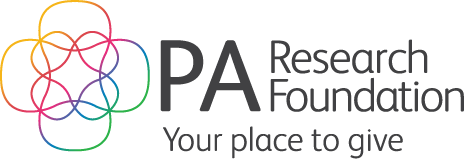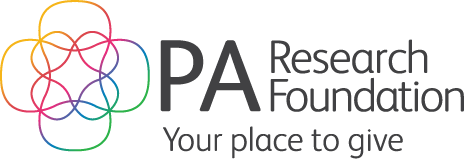
Professor Rik Thompson is a mind in demand. The Queensland University of Technology (QUT) Professor of Breast Cancer Research is currently involved in multiple cutting-edge research studies, including a promising triple negative breast cancer project.
He is also working on a mammographic density project and as an advocate and a facilitator for advancing liquid biopsy in breast cancer and plasma gas therapy project, being part of PA Hospital multidisciplinary cancer teams for these projects.
Thanks to Foundation funding for a matching grant from Tour de Cure, Prof Thompson has been able to advance a triple negative breast cancer study to the point where he has now received mainstream funding from the National Breast Cancer Foundation (NBCF). That work developing what’s known as patient derived organoids, i.e., understanding cancer biology by making models for personalised cancers in 3-dimensional cultures, is now progressing. Collaboration with the breast oncology team has allowed for more than 50 accruals from breast cancer patients with informed consent and cooperation with surgeons, radiologists, medical oncologists and pathologists from the PAH.
“There is a particular unmet need for research on triple negative breast cancer, so called for lacking the 3 common therapeutic receptors ER, PR and HER2, but there are also practical reasons making it good to study in relation to aligning our studies with the clinical experience at the PA,” Professor Thompson said.
“A recent clinical trial that showed that a combination of neoadjuvant immunotherapy and chemotherapy before surgery was quite beneficial. Not only was there a higher rate of response to the neoadjuvant chemo-immunotherapy, it showed that further survival after that neoadjuvant treatment was improved. For us, in terms of modeling what's going on and accessing the tissue, this has been helpful. Accessing the tissue at the time of biopsy prior to that neoadjuvant therapy allows us to establish our cultures and we then get an indication from the clinicians after the patient had been through the neoadjuvant therapy as to whether they’ve had had a complete pathological response, or had had a partial response, etc.
“If a partial response, we sometimes can get the tissue again after the three or four months of neoadjuvant therapy (if it us surplus to pathology needs) - we're culturing one of these currently and it's growing – very exciting. So, we'll soon be able to compare the cells that we got before the neoadjuvant therapy with the cells that were not completely eradicated by the neoadjuvant therapy.”
As well as looking at the differences in responses and outcomes of therapies prior to surgery, the research also aims to examine what therapies may be more beneficial to potential patients.
“The patients will continue on immunotherapy after surgery (adjuvant therapy). It’s harder for us to model immunotherapy in the lab because it requires an intact immune system. It's not impossible, and there is published research on it, so we're also collecting blood to get the circulating immune cells called PBMCs, peripheral blood mononuclear cells and introduce those into the cultures we work with, and see whether the immunotherapy can have an effect in those cultures,” Professor Thompson said.
“That's the next step really, or a new aim. It's exciting to be able to compare these cells at a number of levels. We can test them against the drugs that were used for neoadjuvant therapy and say, okay, it looks like they just didn’t respond to that drug, and maybe that's why there is residual, and we can potentially ask, well, what drugs might work?
“Then, in terms of new approaches to therapy in breast cancer, the Tour de Cure was really about trying out a regimen using an already approved drug called eribulin, which is approved for late use in advanced breast cancer.
“It's second line chemotherapy in the USA and third line in Australia. Some studies have shown that a sub-lethal dose (a low dose) of that drug can cause a phenotypic change in the cells that then makes them more susceptible to regular therapies - we call this chemo-sensitisation. The phenotypic change here is something that I've been working on forever, the epithelial mesenchymal transition (EMT), which is strongly implicated in both metastatic progression and therapy resistance (see recent review PMID: 40696171)
“That's what our NBCF grant is all about, targeting the epithelial mesenchymal hybrid state. The Tour de Cure was about trying to reverse any EMT and see whether or not they responded better to standard therapies. There are also trials that show that when eribulin is used together with other therapies, the patients do better.
“These two projects in breast cancer, the eribulin reversal of EMT and then going on to identify some of the unique features around the EM-hybrid cells in breast cancer that could become therapeutic targets using state-of-the-art methodologies, reflect new approaches to target metastatic progression and therapy resistance.
“That's what we're trying to do with the NBCF grant, it's all pretty translational. We're very excited about it.”
Professor Thompson explained that his recent successes would not have occurred without the flexibility and support of the PA Research Foundation.
“In 2023 we were scraping the barrel to keep the lab going. I applied for extraordinary funding with the Foundation and they were open to it being used in a matching category with Tour De Cure,” he said.
“That enabled us to leverage other funding from the QUT Centre for Genomics and Personalised Health where I am based, as well as Tour de Cure, and this combined support has allowed us the momentum to now attract this Category 1 funding from the National Breast Cancer Foundation, so we’re really grateful to the Foundation and their donors.”




